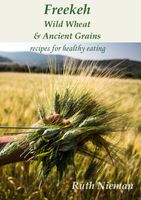Khorasan wheat (Triticum turgidum subsp. Turanicum) is also known as Oriental wheat but is better known commercially under its brand Kamut, trademarked in 1990, and meaning “wheat”, a name derived from the ancient Egyptian language.
John Percival, an English Professor of Botany whose early research in 1921 into grains and cereals was documented in his monograph The Wheat Plant, concluded that khorasan was an ancient wheat species, native to the Fertile Crescent and Mesopotamia and related to both emmer and einkorn. Khorasan was originally named after the largest province of Persia (which became modern day Iran in 1935), where agriculture dominated. Percival’s research was conducted on a wheat species believed to have been an earlier genus of khorasan, that was sent to him by English Brigadier General Sir Percy Molesworth Sykes, who travelled extensively throughout Persia and the surrounding region, recording in manuscripts the descriptions of his travels, the country’s history and its rich landscape and natural bounty. This particular variety of wheat differed from emmer and einkorn only in its colouring of much darker awns, which he documented as “jet black”. This was thought to have been a wild variety of khorasan wheat, as the domesticated khorasan possessed white glumes.


